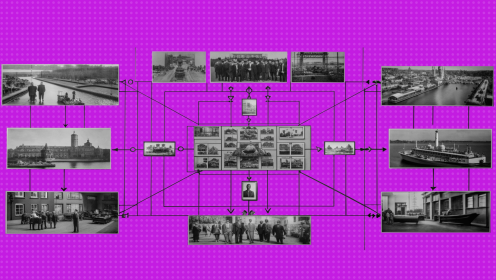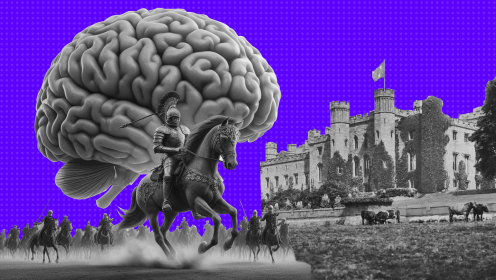I like to pump up my soft skills, but I somehow did not succeed with leadership. When I think about my leadership qualities, I immediately have a lot of doubts. No matter how hard I try, I can't get out of my head the image of a "politician, leader and fighter", with which I am not associated in my head in any way. However, having understood the question, I realized that there are completely different leaders, and, in a sense, everyone should be one.
But about everything in order.
Who is the leader
To begin with, let's define the understanding of the term "leader" itself.
In article about soft skills, I wrote that "leadership" is the ability to rally like-minded people around you and lead a team to success. And this does not necessarily apply to work. We live in a society surrounded by people with whom we constantly interact, so we meet all kinds of leaders in almost any sphere (whether we notice it or not): from parents and teachers to bloggers and politicians. Yes, what's there — at a certain stage of life, any person can be a leader himself (when you tell your friends as a child that it's better to go to beat nettles with sticks, rather than swing on a swing, and everyone goes together to look for more powerful sticks — this is also leadership).
Often a leader is perceived as a person who manages people, but this definition is not quite correct and is more suitable for a manager/boss/boss. For the latter, people are subordinates, not a team. A tool for achieving goals, so to speak. The manager does not care whether you are satisfied or not — it is important for him that everything works. Due to the fact that non-leaders do not know how to inspire people to achieve things, they often have to control everything, use people like hands. So I want to hit the pseudo-linguistics and say that it is not for nothing that the word "leader "has the word"hand". But jokes aside. A leader is not necessarily a leader. It is not the position that makes a person a leader, but his actions, qualities and skills.
Are leaders born or become leaders?
On the one hand, there is a theory of great people, according to which people inherit certain character traits and leadership qualities. However, if they do not develop them, they are unlikely to become leaders.
On the other hand, there is a reasonable opinion that all people are born with equal abilities and opportunities. And their success in the leadership field depends on how they will work with this resource.
That is, whichever option is correct (although I still tend to the second), the most important thing is to constantly look for opportunities for development and work on yourself. I think that with proper perseverance, anyone can become a leader. Whether he wants to is another question.
Why become a leader
I constantly ask myself this question when the topic of developing leadership qualities and skills is raised. The answer to it is different, depending on whether you control something or not.
- If you manage a team or an entire company, leadership will help make the business competitive, save resources and prevent turnover. After all, in order to develop a company, you need to unite and motivate the team.
- If you manage nothing but yourself, there is still a benefit in leadership. The fact is that leaders are listened to. For people, as social beings, it is very important to be listened to. If our opinion is listened to, it has a positive effect on our self-esteem. I think that this is why many people blog, dream about media and somehow become leaders (leaders of public opinion) - all in order to be listened to.
Qualities and skills of a leader
So, a leader is a person with authority who is able to influence the behavior of other people. This is what distinguishes the leader from other members of the team. On the one hand, it makes no sense to generalize the qualities of leaders, because different people are convinced by different qualities. But on the other hand, there are a number of qualities and skills that every leader should have, regardless of where and with whom he works.
Most leadership skills are just ordinary soft skills, so don't be surprised.
Risk management
It is important for a leader to be able to anticipate risks and eliminate them in time in emergency situations. This skill is especially important for leaders who work in startups, where there are a lot of these risks due to uncertainty. But in many other situations, it is very important to be able to manage risks: when you rush to implement everything new, without testing anything; when you want to make changes for the sake of changes, etc.
Innovation
The ability to look at familiar things in a new way is very important. It helps both you and the team members not to stay still and constantly move forward, increase their competitiveness and develop broad and non-standard thinking. To transfer the service to a new architecture, to optimize the work of the team according to a new working methodology, to introduce new features into the product — all this is cool and useful (if you assess the risks, of course). Look for connections between things that, at first glance, are not related to each other and do not be afraid to experiment.
Delegation
As I have already said, the inability to entrust the work to other people and total control are the signs of a non — leader. A real leader understands that he cannot cope alone and is not afraid to distribute roles among the team members. A team with competently distributed responsibility and a clear understanding of goals and objectives is characterized by higher productivity and, accordingly, achieves results faster than a team in which the "leader" is afraid to delegate.
Prioritization
I have a problem with prioritization. This is partly why I can't think of myself as a leader yet, because without this skill, I won't be able to manage more myself, and even more so — to explain to the team members which tasks are paramount and which can be postponed. And without this, the team will not be able to work normally — people will constantly feel overloaded and, sooner or later, they will stop understanding what is happening at all.
Self-confidence
If you, as a leader, are not confident in yourself, other people will not trust you to manage themselves, and even more so will not listen. In addition, self-doubt will prevent you from developing charisma.
Keep in mind that self-confidence and self-confidence are different qualities. The first helps to develop authority, and the second only irritates others.
Expertise and constant self-development
In order for your words to be listened to, you need to have a very good command of the topic. It is difficult to treat normally a person who edifiingly speaks out, but, at the same time, does not understand the issue. At the same time, an expert in the field automatically becomes an informal leader of people who are less competent, even if he is not a leader. Therefore, to become a real leader, you need to constantly improve your knowledge, do not miss a single opportunity to learn something new and useful.
Ability to solve conflicts
The team leader should be able to avoid conflicts and resolve conflicts in the team. We have a big article about this — be sure to read it.
Courage and determination
A good leader should be able to quickly move from words to actions. Long reflections give rise to doubts and indecision. I don't want to say "think less — do more" (this somewhat contradicts the ability to manage risks), but there is a certain meaning in this.
In addition, no one will ever follow a person who is afraid of everything and does not dare to take a step.
Sociability, politeness and the art of negotiation
One of the main qualities of a leader is sociability. After all, leadership is a product of society. This skill is very useful for managing people, and in general for life. During communication, be polite, do not be rude, show empathy and be interested in the interlocutor. If you win over the team, you will always receive feedback. And feedback is very, very important for a leader.
Discipline
A good trait is not only a leader, but also any person in general who considers his own and someone else's time a valuable resource. Disciplined, demanding people set an example for their followers.
Responsibility
The ability to be responsible for their actions is a distinctive feature of a leader. He is psychologically mature and stable, does not look for someone to lean on and knows how to rely only on himself. Therefore, try to be responsible for your words, decisions and actions. Well, do not shift the responsibility to others to hide mistakes.
Organization
And, of course, a real leader should be able to organize not only himself, but also others. To do this, you need to have a systematic thinking, find optimal solutions and rationally manage the available resources.
I hope that it has become clearer to you what leaders are like, and what qualities and skills you need to acquire to become one of them. Being a leader is cool, but not everyone becomes a leader, for one reason or another (can you imagine what would happen if every second person was a leader?). Therefore, before you start self-development and move towards leadership, figure out whether you need it.


















